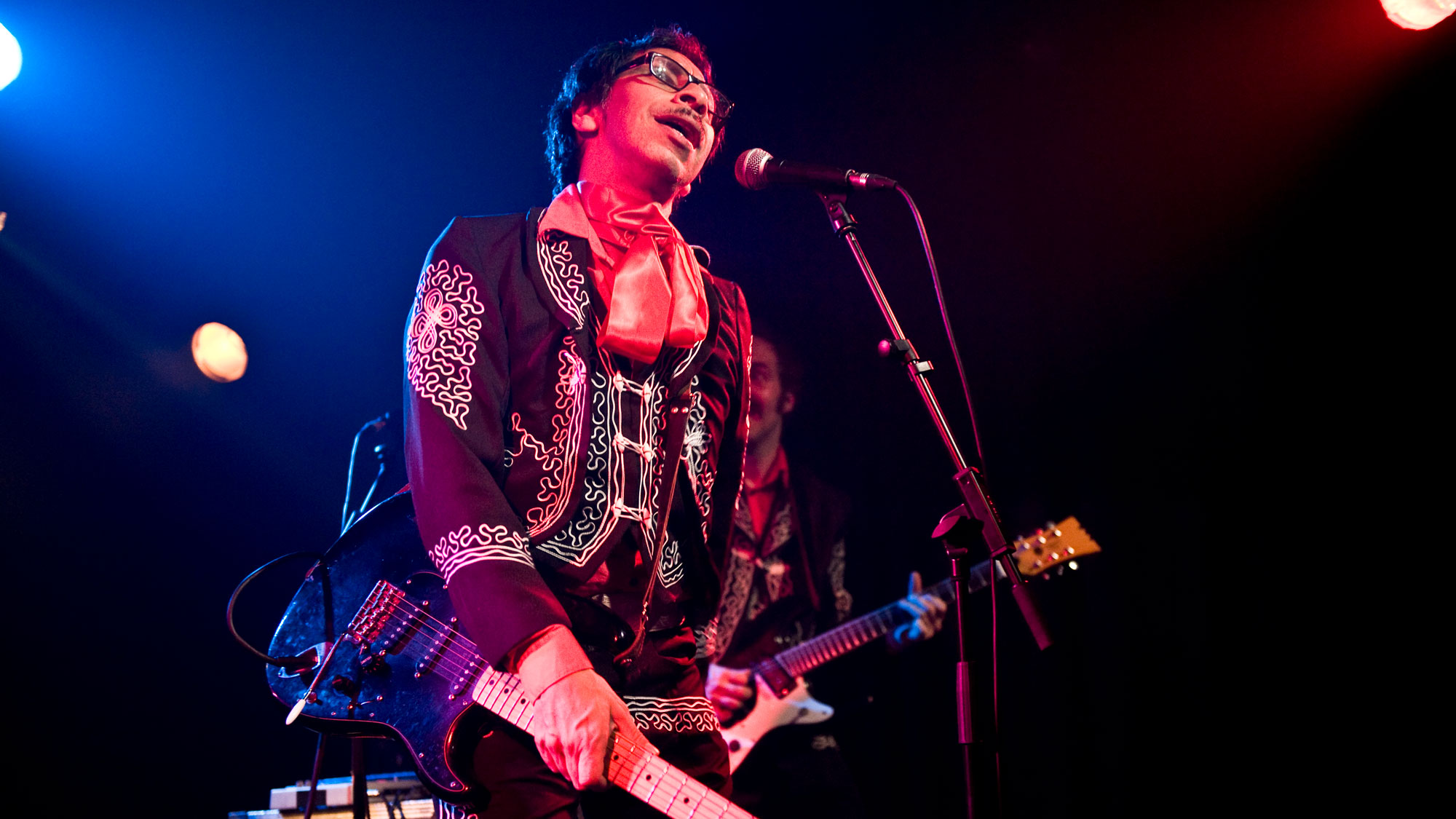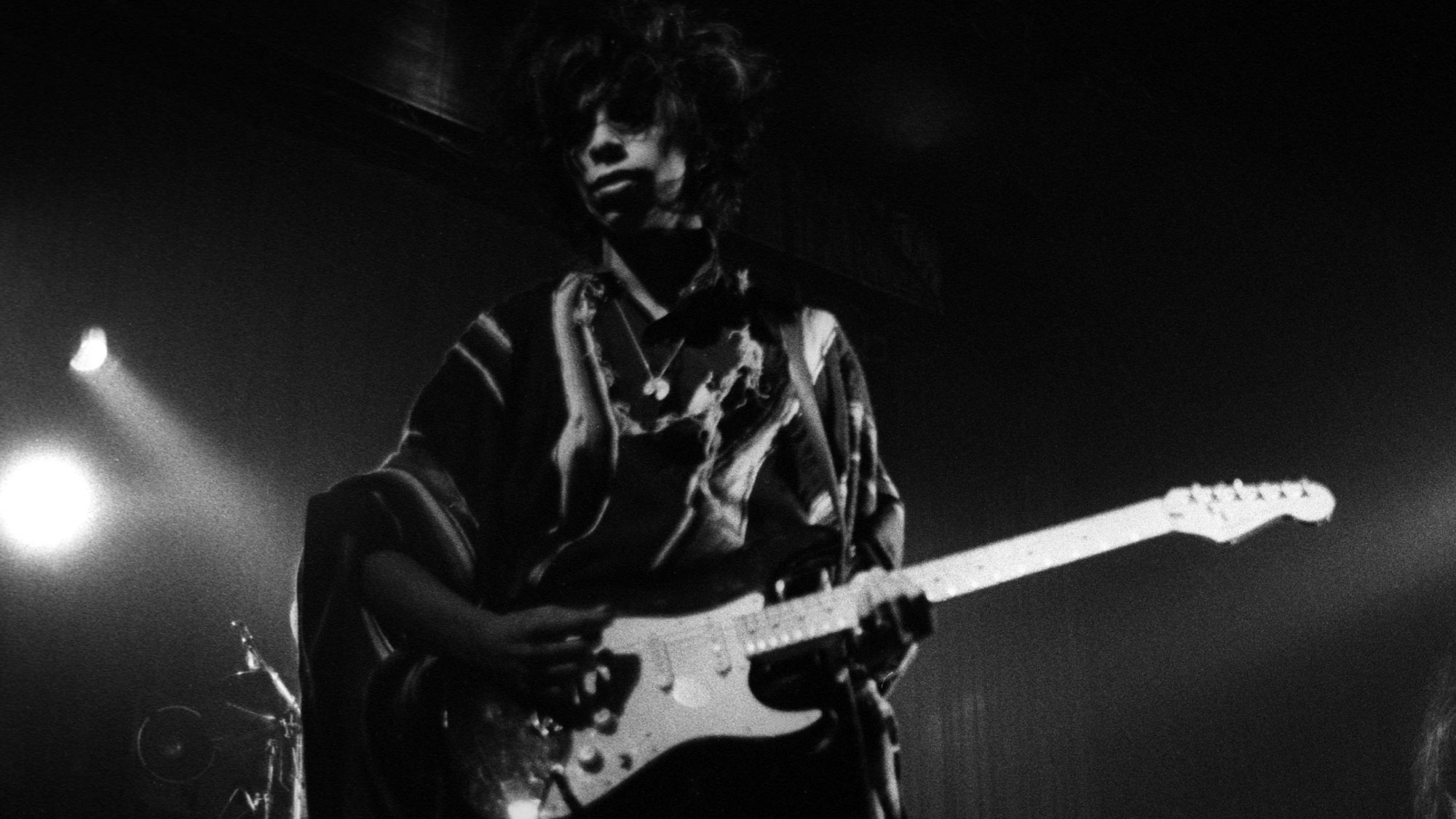
The release of 1984’s The Las Vegas Story saw the Gun Club step away from the ramshackle DIY ethic of their first two albums.
The album saw the return to the lineup of guitarist Kid Congo Powers after three years spent touring and recording with the Cramps. The raw fervor of Fire of Love (1981) and Miami (1982) remained undimmed, but singer Jeffrey Lee Pierce, who formed the band with Powers in 1979, had decided to start playing guitar again for their third album.
The songs benefited from the extra textures and layers that the twin-ax attack afforded, with Powers and Pierce winding in and around each other’s guitar parts.
The Las Vegas Story is the only album recorded by what many consider to be the band’s classic lineup, with Patricia Morrison on bass and Terry Graham on drums. The Gun Club split up a year after its release, with Pierce going on to reform the band a number of times with varying lineups, until his premature death in 1996 from a cerebral hemorrhage.
Powers joined Nick Cave and the Bad Seeds in 1986, remaining with Cave for four years. Powers rejoined Pierce in the ever-shifting lineups of the Gun Club until 1996.
He formed the Pink Monkey Birds the following year and has been fronting the band – on guitar and vocals – ever since. They’ve just released That Delicious Vice, a swirling melange of voodoo jazz, soundscape instrumentals and psychotic lounge music that will instantly resonate with fans of any of Powers’ previous bands.
Why do you think The Las Vegas Story sounded so different from the previous albums?
“Jeffrey and I were definitely creatures of whim, musically. We were always looking to move forward in whatever we were doing as a band; we were easily bored. It was a very planned record. Rehearsing had never been our great forte, [Laughs] but we applied ourselves.
“We had been playing a lot of the songs live and had worked out what we wanted to do in terms of arrangements. We had Jeff Eyrich producing; he really liked us and our ideas – which was new to us. [Laughs] We were on Chris Stein’s label, Animal Records, so we had a bigger budget and free rein, but also more conditions, particularly that we needed to have a producer.”
How did you come to rejoin the band after your tenure with the Cramps?
“Jeffrey called me, as yet another version of the band had quit in the middle of nowhere, [Laughs] and he asked me if I could fill in for a tour of Australia in 1983. Jeffrey started to play the guitar again at that point, so it was the start of a new musical beginning for the band, a new sound.
The Blasters were mentors to us – our very first show was supporting them
“I was tuned to E, which is what I’ve always done from when I first started playing. I did all the slide parts plus whatever else was needed. We just found an organic way to combine our different approaches; we were able to explore sounds and atmospheric things with the two-guitar approach.”
Dave Alvin plays killer solos on a couple of tracks. How did his involvement come about?
“We’d opened for the Blasters quite a few times and had formed a strong friendship with them, so when the idea occurred to us that it would be great to bring Dave in to play some incredibly searing solos, he was happy to help out. The Blasters were mentors to us – our very first show was supporting them.”
What electric guitars and guitar amps did you use for the album?
“Jeffrey and I used Fender Stratocasters with a Twin Reverb. Having said that, we were recording at the same studio complex as Ry Cooder, who was making Paris, Texas. He was on the day shift, and we were on downtime, as it was a lot cheaper to record. We’d check out a lot of those old, cool amps that he had.
I wasn’t really a pedal user at all back then, and even now I barely use any pedals
“I can admit, now that the years have passed, that we did make liberal use of some of those great little combos that he had, without his knowledge. [Laughs]
“I had discovered the world of fuzz pedals when I was in the Cramps, so I was using a mustard-colored MXR distortion pedal [MX-104]; they’ve been remade but they don’t sound the same as the old ones. I also used a Tokai overdrive. I wasn’t really a pedal user at all back then, and even now I barely use any pedals.”
Did working with the Cramps bring a different perspective to playing with the Gun Club after a couple of years away from the band?
“When I left to join the Cramps I’d only been playing for one year, so I was just starting, I guess, and doing the best I could to keep up. By the time I returned to the Gun Club I’d made a few albums and toured around the world, so I was much more experienced and confident in my abilities.
“I think I learned how to paint a picture with sound. Ivy [Cramps guitarist Poison Ivy Rorschach] would tell me to think of the guitar as a horn line and not be afraid to squawk and let loose. They afforded me the freedom to experiment.”

Interpersonal band relationships started to fracture within a relatively short time after the album was released. At the time of recording, did it feel like you were all on the same page and committed to moving forward?
“I think, for me and Jeffrey, it was a great time. We were happy to be in each other’s company again. We were very adventurous; we were listening to a lot of John Coltrane, Albert Ayler, Anthony Braxton – free jazz, you know?
“We were taking lots of drugs, and they were still working in our favor at that point, before we hit the wall soon after. [Laughs] That always happens. The mood was good, and Patricia was really great, and she was very up for what was going on.”
The two cover versions, Gershwin’s My Man’s Gone Now and The Master Plan by Pharoah Sanders, were pretty left-field. How did they come about?
“It was very much a reflection of the music we were listening to. I was astonished that Jeffrey could play some of those things on guitar. We were creatures of our own appetites, and free jazz came very much into our music, which I was introduced to by Jeffrey. It was a language that spoke to us, but we weren’t jazz players – Jeffrey always said we should just think like jazz players.”
I think it stands up, 100 percent. It is perfect for what it is – there’s nothing I’d change about it
How do you view the album, looking back?
“I think it stands up, 100 percent. It is perfect for what it is – there’s nothing I’d change about it. It’s different from the previous records and it has a sustained mood that runs throughout it.”
The new Pink Monkey Birds album, That Delicious Vice, combines quite a mix of influences. What’s the writing process there?
“We come up with the songs as a group collective; in the earliest days it was the only way to pay people. [Laughs] It keeps everyone excited when they have a personal involvement in the creation of the songs. We don’t discuss what we’re doing; it’s just chemistry and the sound becomes its own beast. There’s soundscape things, percussion-heavy songs – we’re an experimental rock band.”
How does fronting your own band compare to playing with the Cramps, Gun Club and the Bad Seeds?
“Both have their advantages. Necessity made me have to be the leader, or else there’d be no band. I enjoy writing and performing, but it’s a much bigger responsibility. I was having to make business decisions all the time.
“I was thinking – Lux, Nick, Jeffrey – all is forgiven. [Laughs] If I ever thought you’d done a bad job, I forgive you! [Laughs] I like when I just get to play guitar, too, though. There’s something really nice about that.”
- That Delicious Vice is out now via In The Red.







